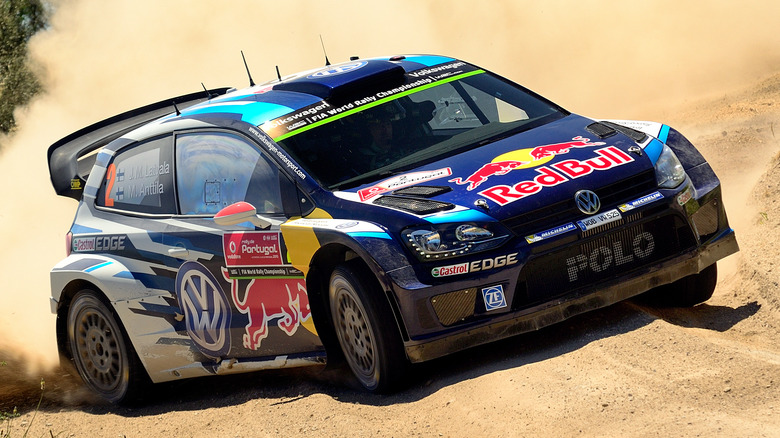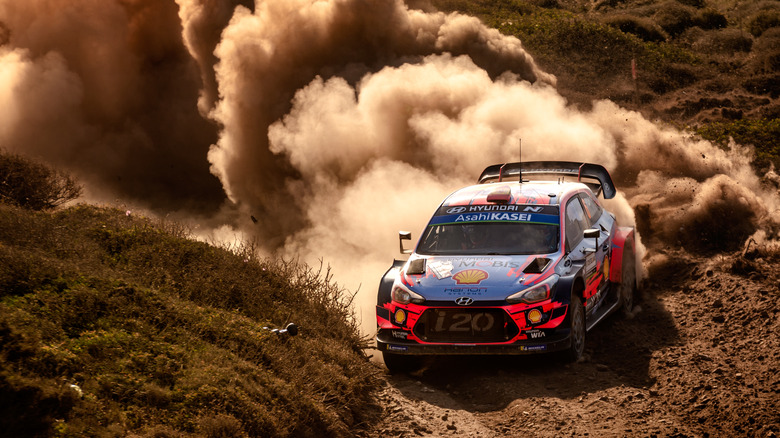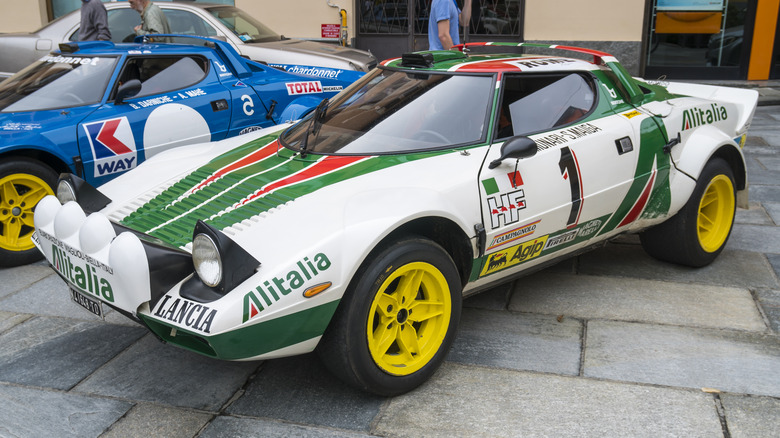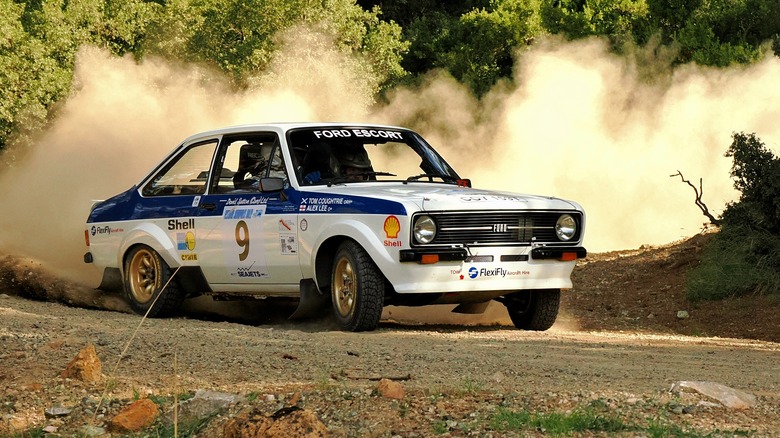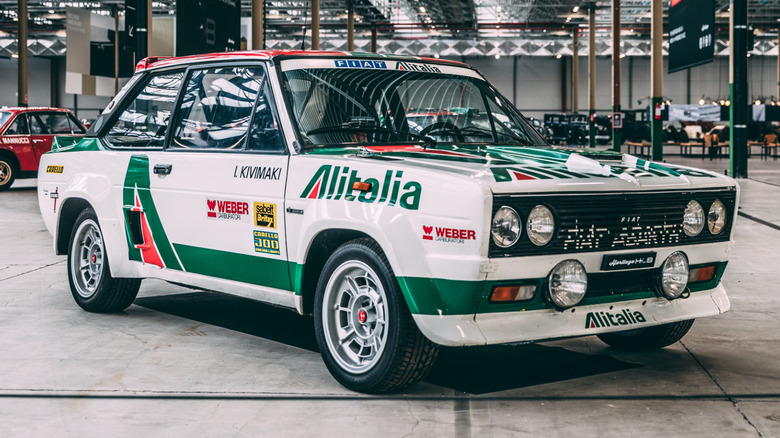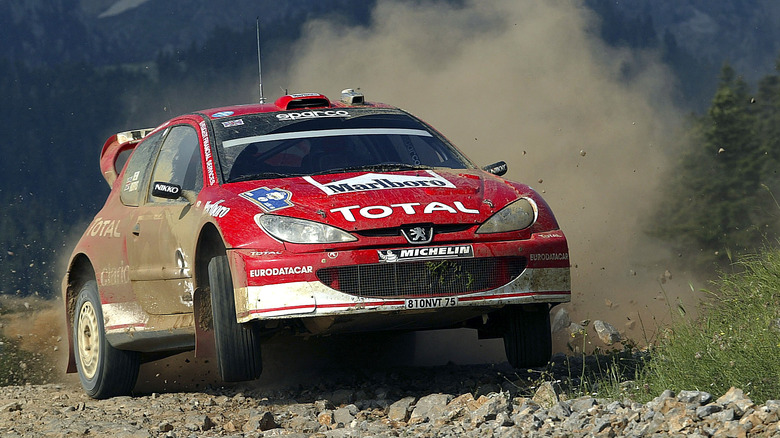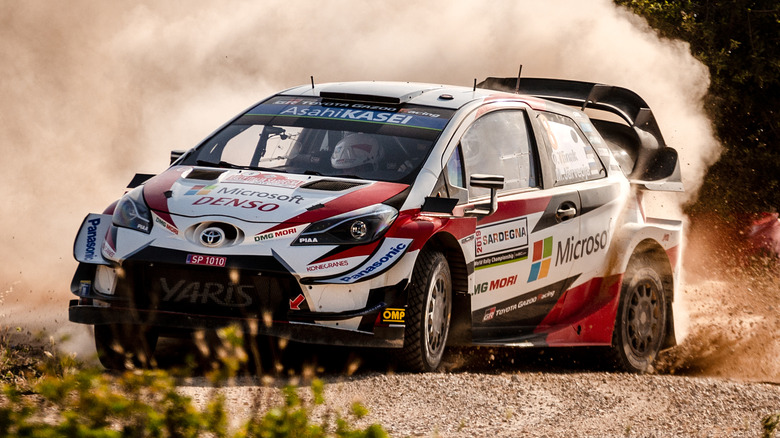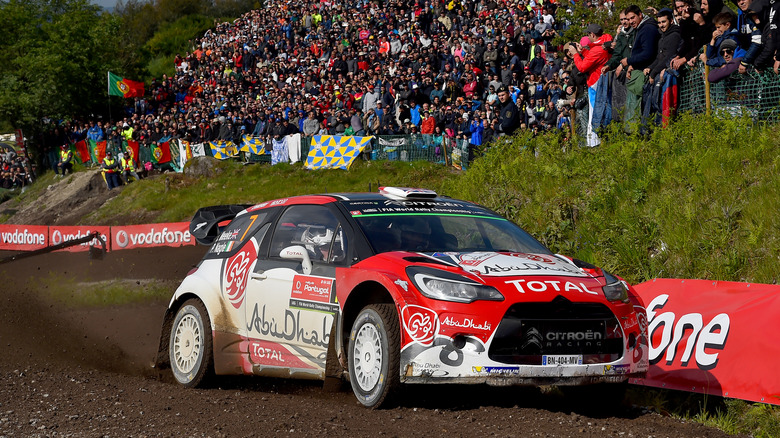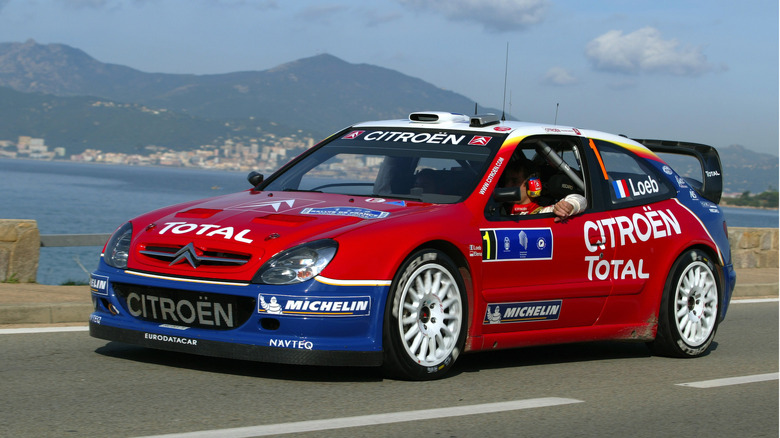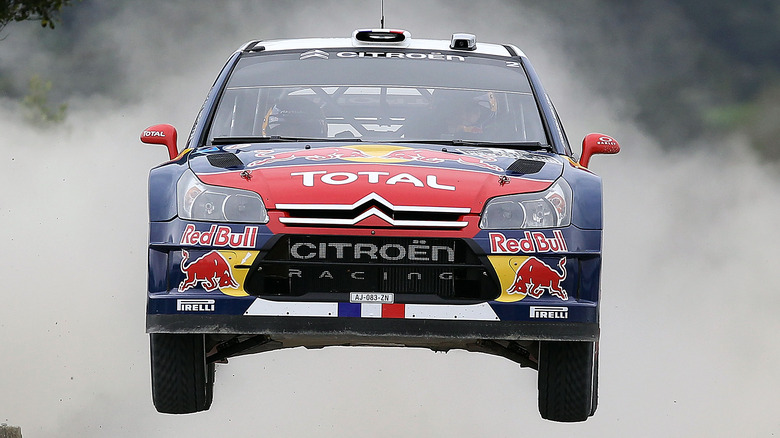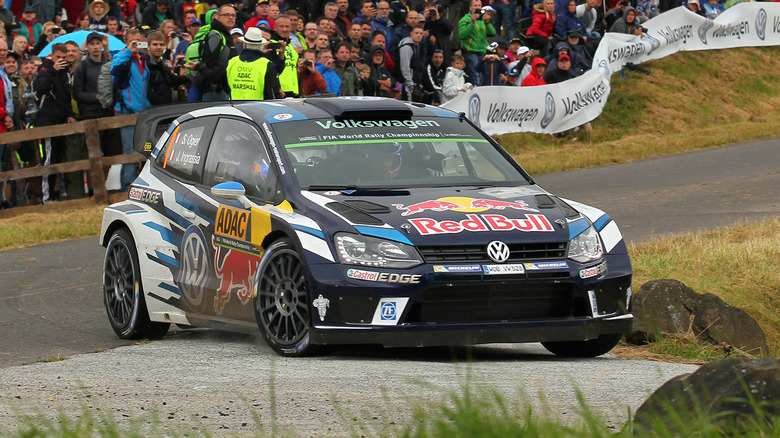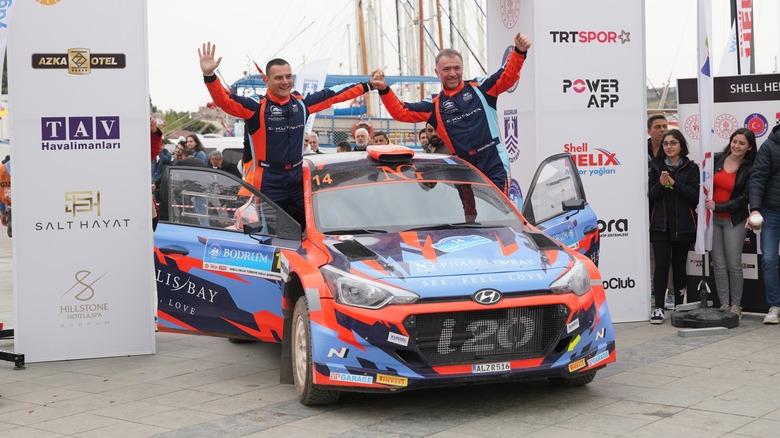The 10 Best Rally Cars Ever Built, Ranked By Wins
Rallying is one of the oldest motorsports on Earth, even though its premiere event — the World Rally Championship — was only officially launched in 1973. In its fifty years of existence, the series has played host to multiple generations of rally cars from the iconic but deadly Group B cars of the '80s to the hybrid Rally1 machines of today. Over the decades, there have been countless cars entered into the championship, but a few have stood out from the rest as exceptionally successful.
We've compiled a list of the top 10 most successful rally cars of all time, ranked by the number of WRC events they've won. It's worth noting that iconic rally cars like the Lancia Delta, Mitsubishi Lancer, and Subaru Impreza are all absent -– each of the three went through multiple distinct generations during their time in the WRC, and we've counted each generation separately. On their own, none of the separate generations make the top 10 for event wins, which might make some of the cars that do all the more surprising. Here are the 10 best rally cars ever made, ranked by their lifetime wins.
Hyundai i20 Coupe WRC – 17 wins
After a largely unsuccessful stint in the World Rally Championship at the turn of the century, Hyundai re-entered the series in 2014. Its most successful car to date has been the i20 Coupe WRC, which was introduced in 2017 after regulation changes meant its previous-gen i20 was no longer eligible. It was only four rallies into the 2017 season that the car gained its first win at the hands of Thierry Neuville. The team managed three more event wins that season, each with Neuville at the wheel. That earned the Belgian driver second place in the drivers' championship, beaten only by the almost unstoppable Sébastien Ogier.
The 2018 and 2019 seasons saw a similar story unfold as Neuville won three and four events respectively in the i20 Coupe WRC, finishing second in the overall drivers' standings both years. However, 2019 was a better year for the team overall, with Hyundai managing to fend off Toyota to win its first manufacturers' title. A shortened season due to the Covid pandemic in 2020 didn't dent the i20 Coupe WRC's competitiveness, with three further event wins helping the team defend its manufacturers' title.
The car's last season in 2021 saw three more event wins added to the tally, two by Neuville and one by Ott Tänak. For the 2022 season, new Rally1 regulations came into force, marking the end of the WRC car era.
Lancia Stratos HF – 17 wins
The Lancia Stratos HF had a remarkably long run in the World Rally Championship, proving itself to be competitive even years after the factory team stopped supporting it. It was first homologated in 1974 and won three events that year, the first of those with Sandro Munari. The Italian driver had already proved the Stratos had pace, winning the non-Championship Firestone Rally the previous year. The 1975 and 1976 seasons proved even more successful, with the car taking four wins each year.
By 1977, however, Fiat's factory team had pivoted to using the freshly developed 131 Abarth for most events, entering the Stratos at only a handful of events and winning just one. By 1978, the Stratos had been demoted to official use in the European Championship, with the Fiat taking the role of the primary WRC contender. However, the Sanremo Rally was included in both championships, and it was there that the Lancia took its sole WRC win that season.
From 1979 onwards, privateers continued racing the Stratos in WRC events, racking up a remarkable three wins that year and another in 1981. By that time, the emergence of Group B cars meant the Stratos no longer had the pace to reach the podium, and after the 1982 season, the car was retired.
Ford Escort RS 1800 MkII – 17 wins
The MkI Escort had proven one of the most successful rally cars of its era, taking a string of wins across rallies from the late '60s onwards. However, it was the arrival of the MkII that really cemented the Escort's place in the rallying hall of fame. The MkII's first WRC win came at the Lombard RAC Rally in 1975, where it led an all-Escort podium. The following year saw just one more win added to the tally, but it was 1977 when the car really shone. It claimed four wins that year, beating its chief rival, the Fiat 131 Abarth.
Three of those victories were thanks to Björn Waldegård, who took the drivers' title that year. In 1978, Waldegård was unable to repeat the feat, handing both the drivers' and manufacturers' titles to Fiat. The Escort took just two event wins that year, but the following year proved to be a return to form. The Escort proved consistently competitive throughout 1979, taking the top spot five times thanks to both Waldegård and his teammate Hannu Mikkola. Waldegård came out on top at the end of the year, taking the drivers' title and beating Mikkola by a single championship point.
The 1980 season saw only one further victory, but 1981's three event wins saw Ari Vatanen take the drivers' title in the Escort. By 1982, however, the RWD Ford had been outclassed by the AWD Group B cars.
Fiat 131 Abarth – 18 wins
The most successful car of its era by wins — beating fellow greats like the MkII Escort and Stratos — is the Fiat 131 Abarth. It took its first world championship event win in 1976 at the Rally of the 1000 Lakes with local star Markku Alén at the wheel. The 1977 season proved a breakthrough one for the car, with five event wins, and 1978 added another five to the tally. In both years, those successes saw Fiat take top honors in the manufacturers' title race.
The 1979 season saw mixed fortunes for the car and only one further event win, as it was unable to match the pace of the Escort MkII. However, the team pulled things back on track for 1980, taking another five wins as the Ford team struggled to match the Fiat's pace. German driver Walter Röhrl gave the car its first and only drivers' title that season as it reclaimed the manufacturers' crown.
The following year, however, the rapid development of the AWD Group B cars meant that the previously warring pair of the 131 Abarth and MkII Escort were faced with increasingly superior newcomers. Both respective teams turned their efforts to developing their Group B successors, but the 131 Abarth managed one final win at the Rally de Portugal before it was eventually phased out.
Peugeot 206 WRC – 24 wins
Although it would end up dominating the WRC during the first years of the 2000s, the 206 WRC was far from a winner at first. It debuted in 1999 but suffered persistent reliability problems during its first season, only managing a single podium finish. The team made extensive changes to the car for 2000, only to face embarrassment at the first event of the year as none of the three cars entered even finished the race. However, fortunes quickly turned, and a stellar drive by Finnish driver Marcus Grönholm saw the 206 WRC achieve its first event win just a few weeks later in Sweden.
Grönholm and his teammate Gilles Panizzi ended up taking six wins across the 2000 season, giving Peugeot its first manufacturers' title since the '80s and the Finn his first drivers' title. Another six wins for the car followed in 2001, with Peugeot retaining the manufacturers' title but losing the drivers' crown to Subaru's Richard Burns.
Peugeot responded by hiring Burns to drive the 206 WRC for the 2002 season, although ultimately, it was Grönholm who delivered the marque its second drivers' and third consecutive manufacturers' title. The team racked up a commendable eight wins that season, but after scoring a further four wins in 2003, the aging 206 WRC was replaced with the new-for-2004 307 WRC.
Toyota Yaris WRC – 26 wins
The most recent car to make the top 10 is the Toyota Yaris WRC. Toyota has a long history in rallying and won multiple world titles in the '90s, but pulled out of the competition after 1999 to focus its efforts on Formula 1. It returned to the sport for the 2017 season, with the Yaris WRC reaching the top step of the podium on only its second-ever outing. Jari-Matti Latvala, who is today the Toyota team principal, was the driver responsible for the win, but it would prove to be his only win of the season. Fellow Finn Esapekka Lappi gave the Yaris its second win later that year in Finland.
The 2018 season saw the team properly find its footing, taking five wins, four of those with Ott Tänak. It was enough to hand Toyota the manufacturers' title, with Tänak ultimately finishing third in the drivers' standings that year. The following year, a seemingly unstoppable Tänak won six rallies, dethroning reigning champion Sébastien Ogier and winning the drivers' title.
Ogier signed with Toyota for 2020 and reclaimed the drivers' crown. Alongside his teammate Elfyn Evans, the pair added four more victories to the car's ever-growing trophy cabinet. The 2021 season was the car's most successful, adding nine event wins to the total. Toyota took both the manufacturers' and drivers' titles thanks to Ogier, who announced his retirement from full-time competition at the end of the season.
Citroën DS3 WRC – 26 wins
One of three Citroën rally cars to make the list thanks to the talents of Frenchmen named Sébastien, the DS3 WRC was introduced in 2011 as the replacement for the C4 WRC. The nine-time WRC champion Sébastien Loeb was instrumental in its development, and it was Loeb who took the car to its first win on its second-ever outing. Loeb and his teammate Sébastien Ogier would record 10 wins in total across the 2011 season, with another 10 racked up in 2012.
These two seasons saw an increasingly tense battle for dominance between Loeb and Ogier, but it was Loeb who would emerge victorious, taking the drivers' title for both years and bringing his total to a record-breaking nine titles in a row. Citroën also retained the manufacturers' crown. Loeb announced that he was retiring from full-time racing after 2012, while Ogier left for VW.
Despite only contesting a partial season with the car, Loeb added another two event wins for the DS3 WRC in 2013, with Dani Sordo clinching a third in Germany. The departure of Sordo and Loeb left Citroën winless for 2014, while 2015 saw only one event win in Argentina thanks to Kris Meeke. The 2016 season was the final one for the DS3 WRC, with Meeke racking up two further wins in Portugal and Finland.
Citroën Xsara WRC – 32 wins
The Citroën Xsara WRC is quite unusual among ultra-successful rally cars in that it took several seasons to really show its pace. It debuted in 2001 and took its first and only win of the season at the Tour de Corse with driver Jesús Puras. In 2002, another single win was achieved thanks to then-rising star Sébastien Loeb, and in 2003, Loeb and teammate Carlos Sainz topped the event standings another four times.
Loeb finished second in the championship driver standings that year, but the following year, claimed his first overall drivers' title. He and Sainz together took seven victories in the Xsara WRC across the season. The 2005 calendar saw Loeb deliver an even more dominant performance, taking 10 event wins and the team's third consecutive manufacturers' title. A further win by François Duval took the Xsara WRC's total up to 11 in the space of just 12 months.
Loeb again delivered the goods in 2006, handing Citroën eight more event wins plus the drivers' crown. The Xsara WRC was replaced after 2006 with the Citroën C4 WRC, which would rack up even more trophies than its predecessor.
Citroën C4 WRC – 36 wins
The most successful Citroën rally car — and the second most successful of all time — the C4 WRC's success can be put down to one man: Sébastien Loeb. It debuted for the 2007 season and Loeb immediately proved its pace by winning the season-opening Rally Monte-Carlo. He followed it up with seven more wins across the year, continuing his string of drivers' titles in the process. In 2008, Loeb racked up a further 11 wins with the car, which was even more impressive considering that there were only 15 events in the whole season, and took seven more in 2009.
The C4 WRC's final season was 2010 as it was eventually replaced by the DS3 WRC. In 2009, Loeb had only retained his drivers' title by a single championship point, only just beating Mikko Hirvonen, but 2010 saw Loeb deliver a much more decisive victory. He beat second place Jari-Matti Latvala by over 100 points, racking up 10 event wins in the process.
Volkswagen Polo WRC – 43 wins
Sébastien Ogier's move from Citroën to Volkswagen for the 2013 season proved to be an extremely wise one. Emboldened by a generous team budget –- thought to be around 100 million euros per season –- Volkswagen and Ogier delivered a partnership so dominant that the Polo WRC remains the most successful rally car ever. That's despite the car only competing in four seasons. Ogier, with assistance from his teammate Jari-Matti Latvala, won ten events in the 2013 season, taking the drivers' and manufacturers' title.
In 2014 and 2015, the pair continued to dominate, with Ogier taking first and Latvala second in the overall drivers' standings both years. In each year, the Polo WRC took 12 wins, easily handing Volkswagen further consecutive manufacturers' trophies. Volkswagen's final season in 2016 saw Ogier take the top spot again, taking six event wins while Latvala and Andreas Mikkelsen added three more wins to the total.
That made the team's last-minute withdrawal announcement even more shocking, but the financial crisis caused by the Dieselgate scandal meant Volkswagen had little choice. With such a dominant car, it's possible that the Polo WRC could have racked up even more wins had Volkswagen remained in the series, but even with its unceremonious exit, it remains the most successful rally car to date.
How we determined our rankings
As mentioned above, our rankings of the top 10 rally cars are determined solely by the number of wins each car has achieved in the World Rally Championship. While this is an excellent measure of how successful these vehicles have been in elite real-world competition, it does leave certain iconic models out, as those cars went through distinct generations while racking up their own impressive totals.
To read more about some of those cars — including the Subaru Impreza, the Lancia Delta, and the Mitsubishi Lancer — we encourage you to explore our previous coverage of the most iconic rally cars ever made.
